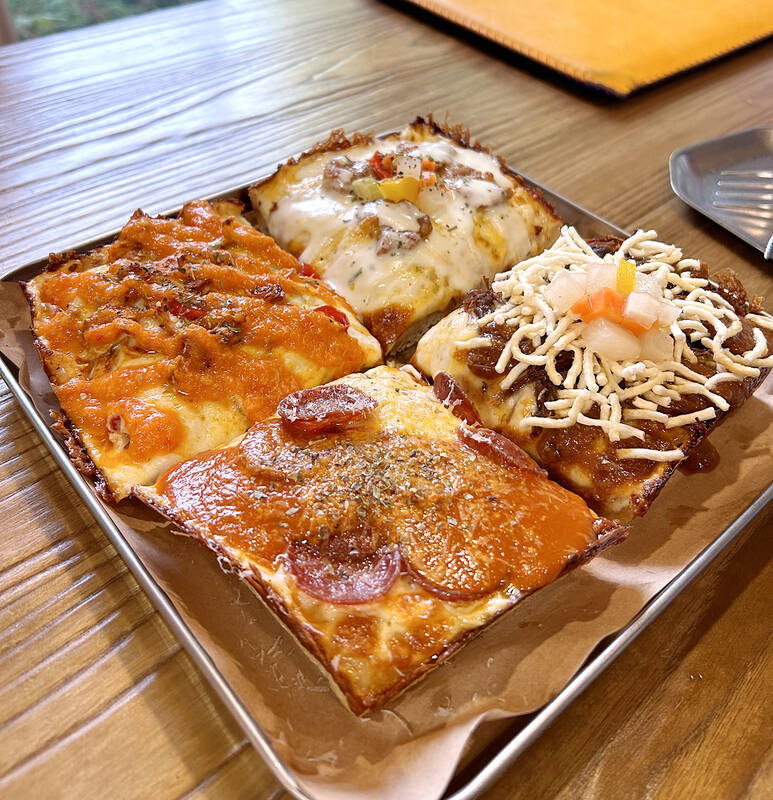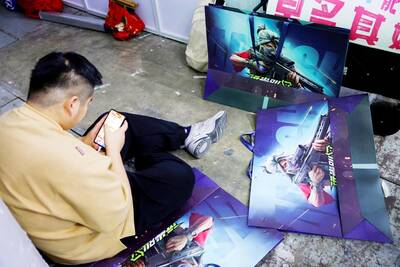Word of mouth spreads fast in this city. Why do I keep hearing about Pizza Bear? Well, these guys take “house-made” and “made with love” to a whole new level, and their Detroit-style square pizza pies, with a chewy sourdough base, cheesy crispy sides and creative flavor combinations, are well worth talking about.
Pizza Bear’s charm starts with owner Chris Foste, a midwestern US native who took his beer-brewing expertise from Illinois and Shanghai and applied it to sourdough starters and pepperoni fermentation here in Taipei. Bar the imported cheese and tomatoes, everything from the sausage to the ranch dressing is made in-house.
Better known as “Beard Bear” (鬍子熊), Foste’s branding centers a cute smiling teddy bear-like caricature of himself, and stepping into Pizza Bear, we feel that rush of hospitality and smiles; customer is king in this casual but comfortable Songshan District (松山) spot.

Photo: Hollie Younger
Pizza Bear serves thin-crust Chicago-style pizza and their classic deep-dish, square Detroit-style pizza. So, what’s the difference? New York pizza: think thin dough, huge triangles, sold by the slice. Chicago Pizza: deep-dish wheels of two-inch-thick dough and melty American cheese. Or is it? Foste says that Chicago deep-dish is actually more of a tourist gimmick or a celebration-only affair for locals. But, in his words, Illinois’ “daily pizza,” sold here, uses a thin, cracker crust, evolved from 1920s taverns that cut square slices to fit onto service napkins. And Detroit? Michigan’s offering features a thick, sourdough base that’s chewy in the center but with a crispy cheese crackling surrounding its rectangular periphery. Layers work in reverse: first toppings, then cheese, then the sauce — to keep the dough from getting soggy, but keeping your fingers delightfully messy.
After launching in New Taipei City’s Sindian District (新店) in 2022, Foste opened this second location in June and it’s been packed every weekend.
Although he has no formal training, he says, “I learned everything from my mammy.” Growing up in rural central Illinois, his mother’s straight-from-scratch, rustic farmhouse cooking stayed with him throughout his career.

Photo: Hollie Younger
The dough? A three-day labor of love, left to rise in individual pans. Pepperoni? Fermented in-house with a Taiwanese-fusion spice blend. Bacon? Three weeks of dry curing, incorporating local flavors inspired by Hakka salty pork belly.
As a craft beer lover, Foste brings the idea of a “flight” of beers to his 4 Square Pizza Flight, where diners can combine any four flavors to make a whole pie. Foste explains that as a chef, he’s always fighting flavor fatigue — and this is the cure.
First up, the bestseller pepperoni (NT$149) is divine. That thick, focaccia-like base is delightfully thick and chewy. The pepperoni discs curl upwards, fatty, spicy and sumptuous.

Photo: Hollie Younger
Next up, my favorite: Chicago sausage with white sauce (NT$149). Fun fact from Foste, Chicago is the only city where sausage is a more popular pizza topping than pepperoni. I understand why; the fennel-laden sausage patty levels out the sweetness of that creamy bechamel sauce with an absurd yet perfect helping of garlic.
The spicy chicken slice (NT$149) packs some heat; the sort that builds but doesn’t overpower. Studying the ingredients of his favorite hot sauce bottles stateside, Foste perfected his own fiery, buffalo-inspired take with hints of pineapple for sweetness.
And finally, the one everyone comes to try, the beef noodle slice (NT$149). This really boggles the mind, recreating the exact Taiwanese flavor profile of cinnamon, star anise and slow-cooked meat. The pizza sauce is reduced broth, topped with tender shredded beef and crispy ramen noodles. To replicate the pickled greens of the original, Foste uses Italian pickled vegetables, Giardiniera, to add that same vinegary, crunchy reprise. This is a must-try, but personally, I’m running back for that Chicago sausage and pepperoni.
Pizza Bear offers fantastic lunch deals, keeping them busy even on a weekday afternoon, with combos of a slice, a chewy cookie and his own-recipe cream soda. But evenings? The place is bumping, offering locally brewed craft beer and highball cocktails. Watch out for the Thursday chef’s special and upcoming happy hour deals.
Foste said it himself, “What kind of pizza restaurant takes reservations?” Well, one that’s homely, truly unique for Taipei and serving pies you’ll dream of, long after the food coma.

During the Metal Ages, prior to the arrival of the Dutch and Chinese, a great shift took place in indigenous material culture. Glass and agate beads, introduced after 400BC, completely replaced Taiwanese nephrite (jade) as the ornamental materials of choice, anthropologist Liu Jiun-Yu (劉俊昱) of the University of Washington wrote in a 2023 article. He added of the island’s modern indigenous peoples: “They are the descendants of prehistoric Formosans but have no nephrite-using cultures.” Moderns squint at that dynamic era of trade and cultural change through the mutually supporting lenses of later settler-colonialism and imperial power, which treated the indigenous as

By 1971, heroin and opium use among US troops fighting in Vietnam had reached epidemic proportions, with 42 percent of American servicemen saying they’d tried opioids at least once and around 20 percent claiming some level of addiction, according to the US Department of Defense. Though heroin use by US troops has been little discussed in the context of Taiwan, these and other drugs — produced in part by rogue Chinese Nationalist Party (KMT) armies then in Thailand and Myanmar — also spread to US military bases on the island, where soldiers were often stoned or high. American military policeman

An attempt to promote friendship between Japan and countries in Africa has transformed into a xenophobic row about migration after inaccurate media reports suggested the scheme would lead to a “flood of immigrants.” The controversy erupted after the Japan International Cooperation Agency, or JICA, said this month it had designated four Japanese cities as “Africa hometowns” for partner countries in Africa: Mozambique, Nigeria, Ghana and Tanzania. The program, announced at the end of an international conference on African development in Yokohama, will involve personnel exchanges and events to foster closer ties between the four regional Japanese cities — Imabari, Kisarazu, Sanjo and

A town in Japan is to urge all residents to restrict their smartphone use to two hours a day in an attempt to tackle online addiction and sleep deprivation. Officials in Toyoake, Aichi prefecture, said the measure would target not only children but also adults, amid growing concern about the physical and psychological toll excessive smartphone use is taking on people of all ages. The move aims “to prevent excessive use of devices causing physical and mental health issues … including sleep problems,” the mayor, Masafumi Koki said recently. The Toyoake municipal assembly began debating the non-binding ordinance this week ahead of a